Analysis of SMEs and Entrepreneurship
VerifiedAdded on 2020/10/05
|16
|4666
|143
AI Summary
The provided document is an analysis of SMEs and entrepreneurship in the context of the UK. It draws from a range of sources, including academic journals, books, and online statistics. The content covers various topics such as the growth of SMEs, challenges faced by small businesses, entrepreneurial spirit, innovation, job creation through social entrepreneurship, and soft skill competencies. The document aims to provide an understanding of the complexities surrounding SMEs and entrepreneurship in the UK.
Contribute Materials
Your contribution can guide someone’s learning journey. Share your
documents today.

ENTREPRENEURSHIP
AND SMALL BUSINESS
MANAGEMENT
AND SMALL BUSINESS
MANAGEMENT
Secure Best Marks with AI Grader
Need help grading? Try our AI Grader for instant feedback on your assignments.
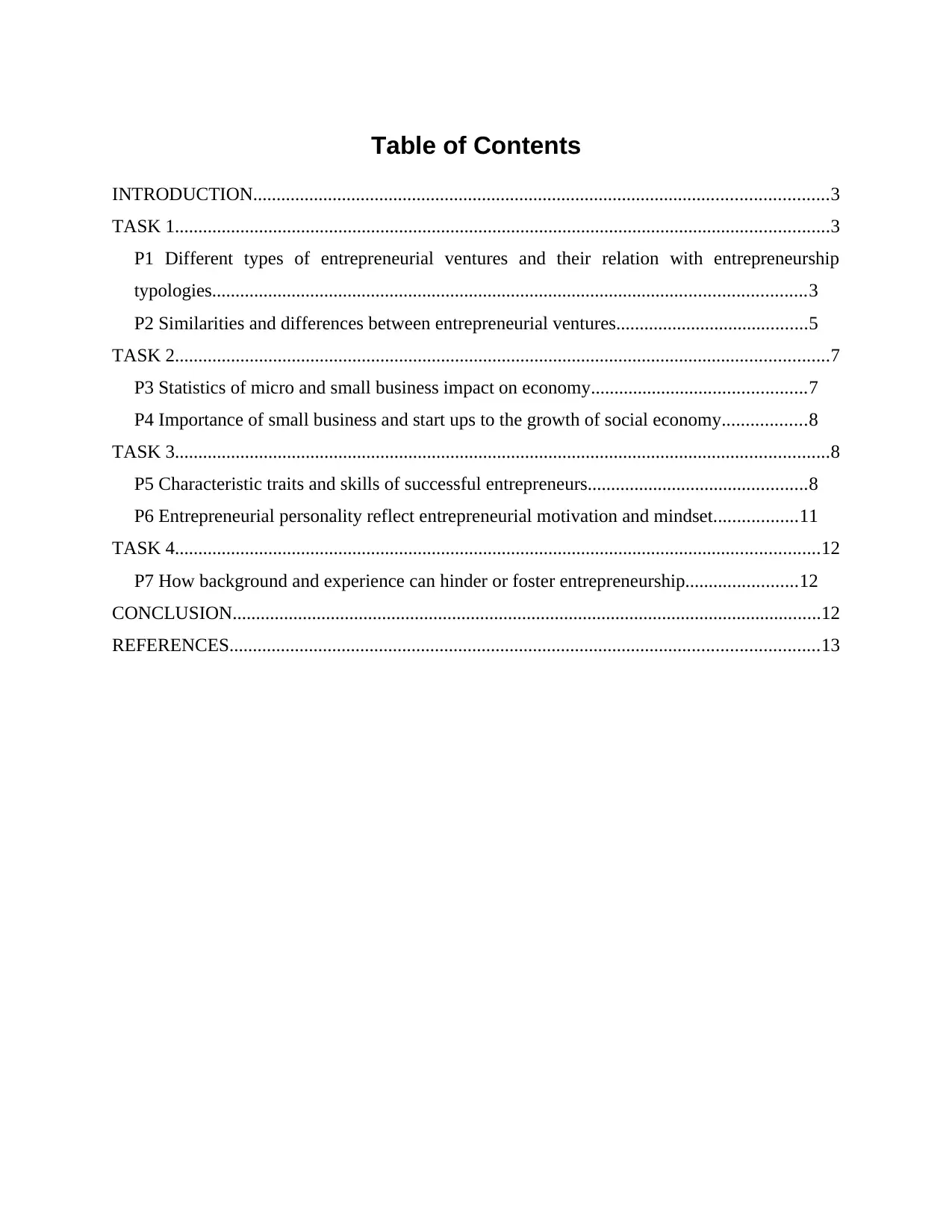
Table of Contents
INTRODUCTION...........................................................................................................................3
TASK 1............................................................................................................................................3
P1 Different types of entrepreneurial ventures and their relation with entrepreneurship
typologies...............................................................................................................................3
P2 Similarities and differences between entrepreneurial ventures.........................................5
TASK 2............................................................................................................................................7
P3 Statistics of micro and small business impact on economy..............................................7
P4 Importance of small business and start ups to the growth of social economy..................8
TASK 3............................................................................................................................................8
P5 Characteristic traits and skills of successful entrepreneurs...............................................8
P6 Entrepreneurial personality reflect entrepreneurial motivation and mindset..................11
TASK 4..........................................................................................................................................12
P7 How background and experience can hinder or foster entrepreneurship........................12
CONCLUSION..............................................................................................................................12
REFERENCES..............................................................................................................................13
INTRODUCTION...........................................................................................................................3
TASK 1............................................................................................................................................3
P1 Different types of entrepreneurial ventures and their relation with entrepreneurship
typologies...............................................................................................................................3
P2 Similarities and differences between entrepreneurial ventures.........................................5
TASK 2............................................................................................................................................7
P3 Statistics of micro and small business impact on economy..............................................7
P4 Importance of small business and start ups to the growth of social economy..................8
TASK 3............................................................................................................................................8
P5 Characteristic traits and skills of successful entrepreneurs...............................................8
P6 Entrepreneurial personality reflect entrepreneurial motivation and mindset..................11
TASK 4..........................................................................................................................................12
P7 How background and experience can hinder or foster entrepreneurship........................12
CONCLUSION..............................................................................................................................12
REFERENCES..............................................................................................................................13
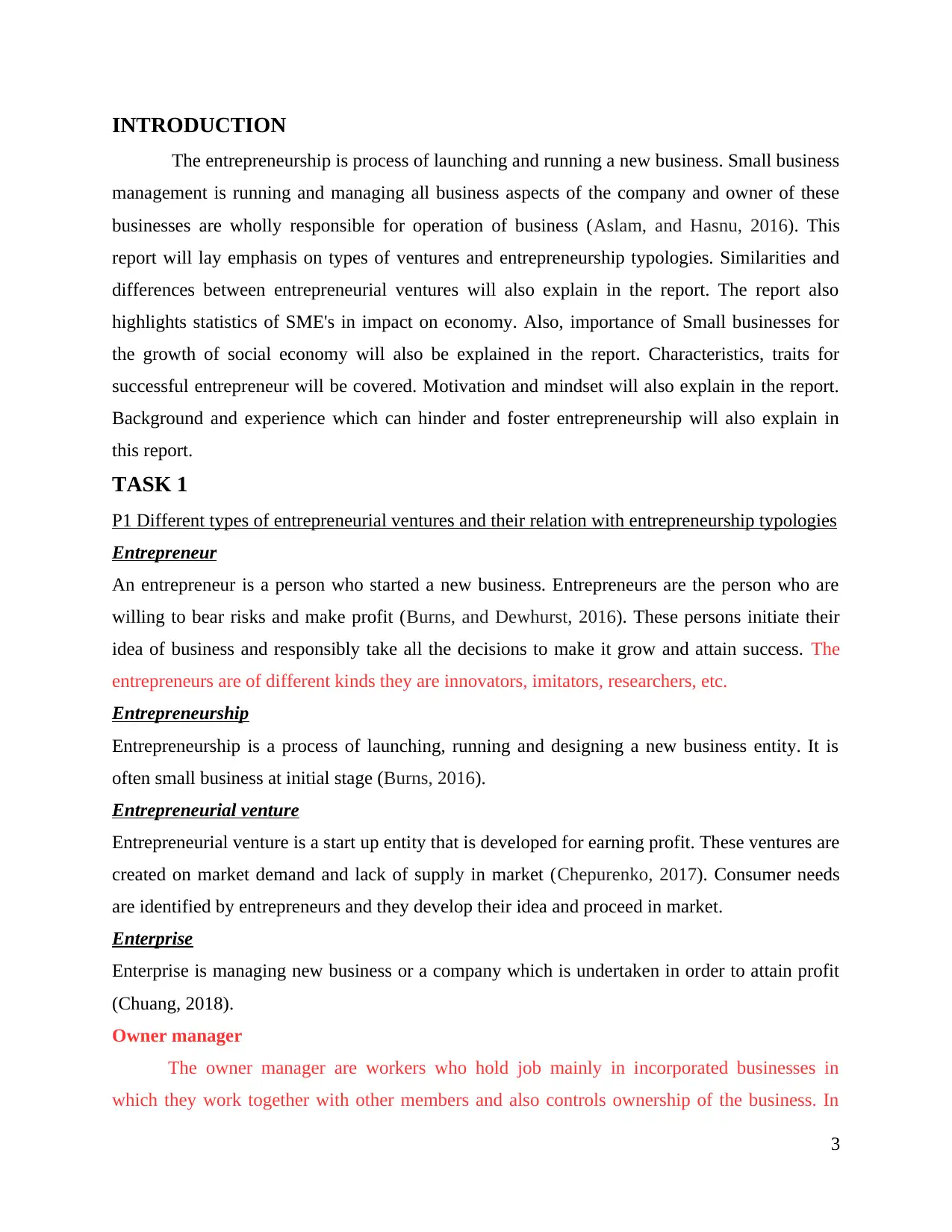
INTRODUCTION
The entrepreneurship is process of launching and running a new business. Small business
management is running and managing all business aspects of the company and owner of these
businesses are wholly responsible for operation of business (Aslam, and Hasnu, 2016). This
report will lay emphasis on types of ventures and entrepreneurship typologies. Similarities and
differences between entrepreneurial ventures will also explain in the report. The report also
highlights statistics of SME's in impact on economy. Also, importance of Small businesses for
the growth of social economy will also be explained in the report. Characteristics, traits for
successful entrepreneur will be covered. Motivation and mindset will also explain in the report.
Background and experience which can hinder and foster entrepreneurship will also explain in
this report.
TASK 1
P1 Different types of entrepreneurial ventures and their relation with entrepreneurship typologies
Entrepreneur
An entrepreneur is a person who started a new business. Entrepreneurs are the person who are
willing to bear risks and make profit (Burns, and Dewhurst, 2016). These persons initiate their
idea of business and responsibly take all the decisions to make it grow and attain success. The
entrepreneurs are of different kinds they are innovators, imitators, researchers, etc.
Entrepreneurship
Entrepreneurship is a process of launching, running and designing a new business entity. It is
often small business at initial stage (Burns, 2016).
Entrepreneurial venture
Entrepreneurial venture is a start up entity that is developed for earning profit. These ventures are
created on market demand and lack of supply in market (Chepurenko, 2017). Consumer needs
are identified by entrepreneurs and they develop their idea and proceed in market.
Enterprise
Enterprise is managing new business or a company which is undertaken in order to attain profit
(Chuang, 2018).
Owner manager
The owner manager are workers who hold job mainly in incorporated businesses in
which they work together with other members and also controls ownership of the business. In
3
The entrepreneurship is process of launching and running a new business. Small business
management is running and managing all business aspects of the company and owner of these
businesses are wholly responsible for operation of business (Aslam, and Hasnu, 2016). This
report will lay emphasis on types of ventures and entrepreneurship typologies. Similarities and
differences between entrepreneurial ventures will also explain in the report. The report also
highlights statistics of SME's in impact on economy. Also, importance of Small businesses for
the growth of social economy will also be explained in the report. Characteristics, traits for
successful entrepreneur will be covered. Motivation and mindset will also explain in the report.
Background and experience which can hinder and foster entrepreneurship will also explain in
this report.
TASK 1
P1 Different types of entrepreneurial ventures and their relation with entrepreneurship typologies
Entrepreneur
An entrepreneur is a person who started a new business. Entrepreneurs are the person who are
willing to bear risks and make profit (Burns, and Dewhurst, 2016). These persons initiate their
idea of business and responsibly take all the decisions to make it grow and attain success. The
entrepreneurs are of different kinds they are innovators, imitators, researchers, etc.
Entrepreneurship
Entrepreneurship is a process of launching, running and designing a new business entity. It is
often small business at initial stage (Burns, 2016).
Entrepreneurial venture
Entrepreneurial venture is a start up entity that is developed for earning profit. These ventures are
created on market demand and lack of supply in market (Chepurenko, 2017). Consumer needs
are identified by entrepreneurs and they develop their idea and proceed in market.
Enterprise
Enterprise is managing new business or a company which is undertaken in order to attain profit
(Chuang, 2018).
Owner manager
The owner manager are workers who hold job mainly in incorporated businesses in
which they work together with other members and also controls ownership of the business. In
3
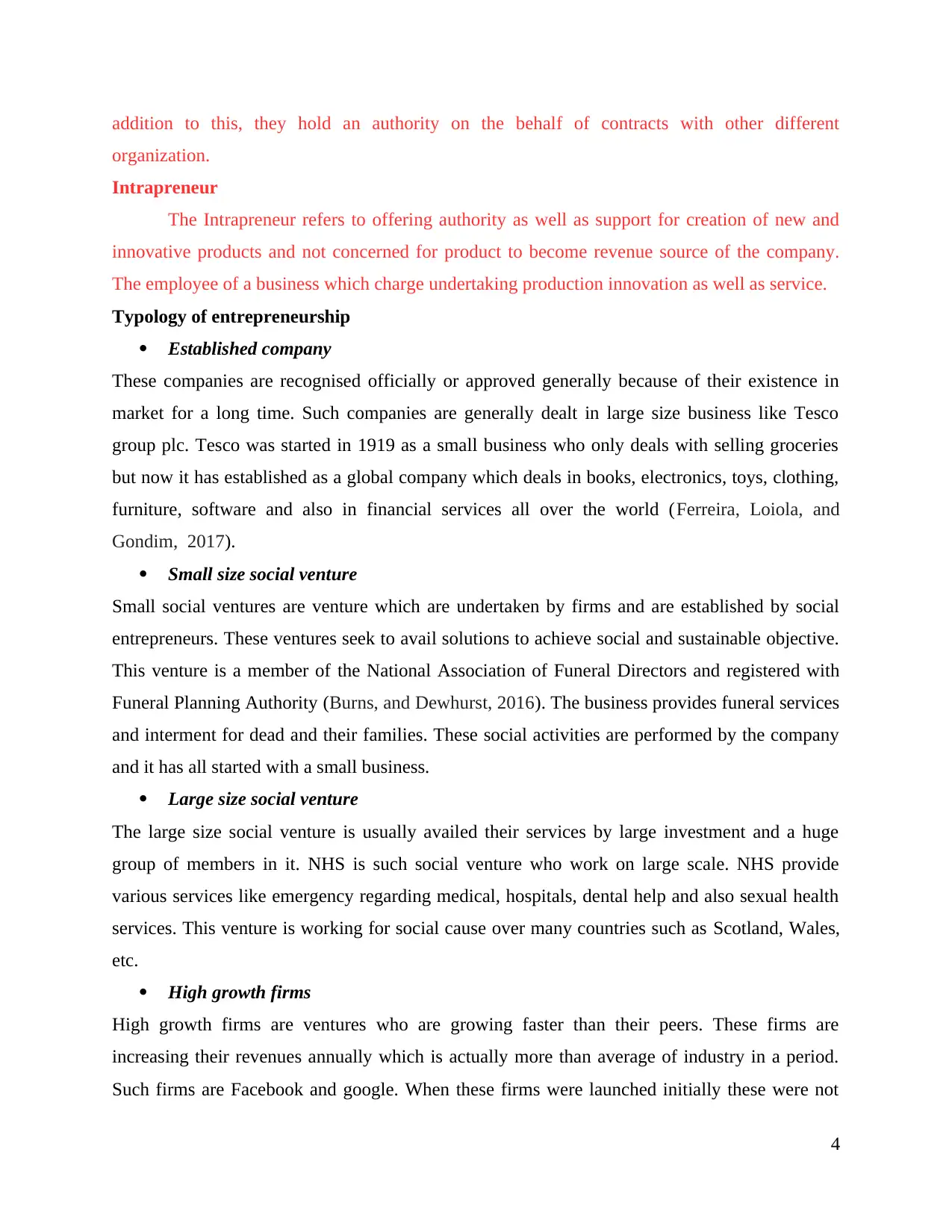
addition to this, they hold an authority on the behalf of contracts with other different
organization.
Intrapreneur
The Intrapreneur refers to offering authority as well as support for creation of new and
innovative products and not concerned for product to become revenue source of the company.
The employee of a business which charge undertaking production innovation as well as service.
Typology of entrepreneurship
Established company
These companies are recognised officially or approved generally because of their existence in
market for a long time. Such companies are generally dealt in large size business like Tesco
group plc. Tesco was started in 1919 as a small business who only deals with selling groceries
but now it has established as a global company which deals in books, electronics, toys, clothing,
furniture, software and also in financial services all over the world (Ferreira, Loiola, and
Gondim, 2017).
Small size social venture
Small social ventures are venture which are undertaken by firms and are established by social
entrepreneurs. These ventures seek to avail solutions to achieve social and sustainable objective.
This venture is a member of the National Association of Funeral Directors and registered with
Funeral Planning Authority (Burns, and Dewhurst, 2016). The business provides funeral services
and interment for dead and their families. These social activities are performed by the company
and it has all started with a small business.
Large size social venture
The large size social venture is usually availed their services by large investment and a huge
group of members in it. NHS is such social venture who work on large scale. NHS provide
various services like emergency regarding medical, hospitals, dental help and also sexual health
services. This venture is working for social cause over many countries such as Scotland, Wales,
etc.
High growth firms
High growth firms are ventures who are growing faster than their peers. These firms are
increasing their revenues annually which is actually more than average of industry in a period.
Such firms are Facebook and google. When these firms were launched initially these were not
4
organization.
Intrapreneur
The Intrapreneur refers to offering authority as well as support for creation of new and
innovative products and not concerned for product to become revenue source of the company.
The employee of a business which charge undertaking production innovation as well as service.
Typology of entrepreneurship
Established company
These companies are recognised officially or approved generally because of their existence in
market for a long time. Such companies are generally dealt in large size business like Tesco
group plc. Tesco was started in 1919 as a small business who only deals with selling groceries
but now it has established as a global company which deals in books, electronics, toys, clothing,
furniture, software and also in financial services all over the world (Ferreira, Loiola, and
Gondim, 2017).
Small size social venture
Small social ventures are venture which are undertaken by firms and are established by social
entrepreneurs. These ventures seek to avail solutions to achieve social and sustainable objective.
This venture is a member of the National Association of Funeral Directors and registered with
Funeral Planning Authority (Burns, and Dewhurst, 2016). The business provides funeral services
and interment for dead and their families. These social activities are performed by the company
and it has all started with a small business.
Large size social venture
The large size social venture is usually availed their services by large investment and a huge
group of members in it. NHS is such social venture who work on large scale. NHS provide
various services like emergency regarding medical, hospitals, dental help and also sexual health
services. This venture is working for social cause over many countries such as Scotland, Wales,
etc.
High growth firms
High growth firms are ventures who are growing faster than their peers. These firms are
increasing their revenues annually which is actually more than average of industry in a period.
Such firms are Facebook and google. When these firms were launched initially these were not
4
Secure Best Marks with AI Grader
Need help grading? Try our AI Grader for instant feedback on your assignments.
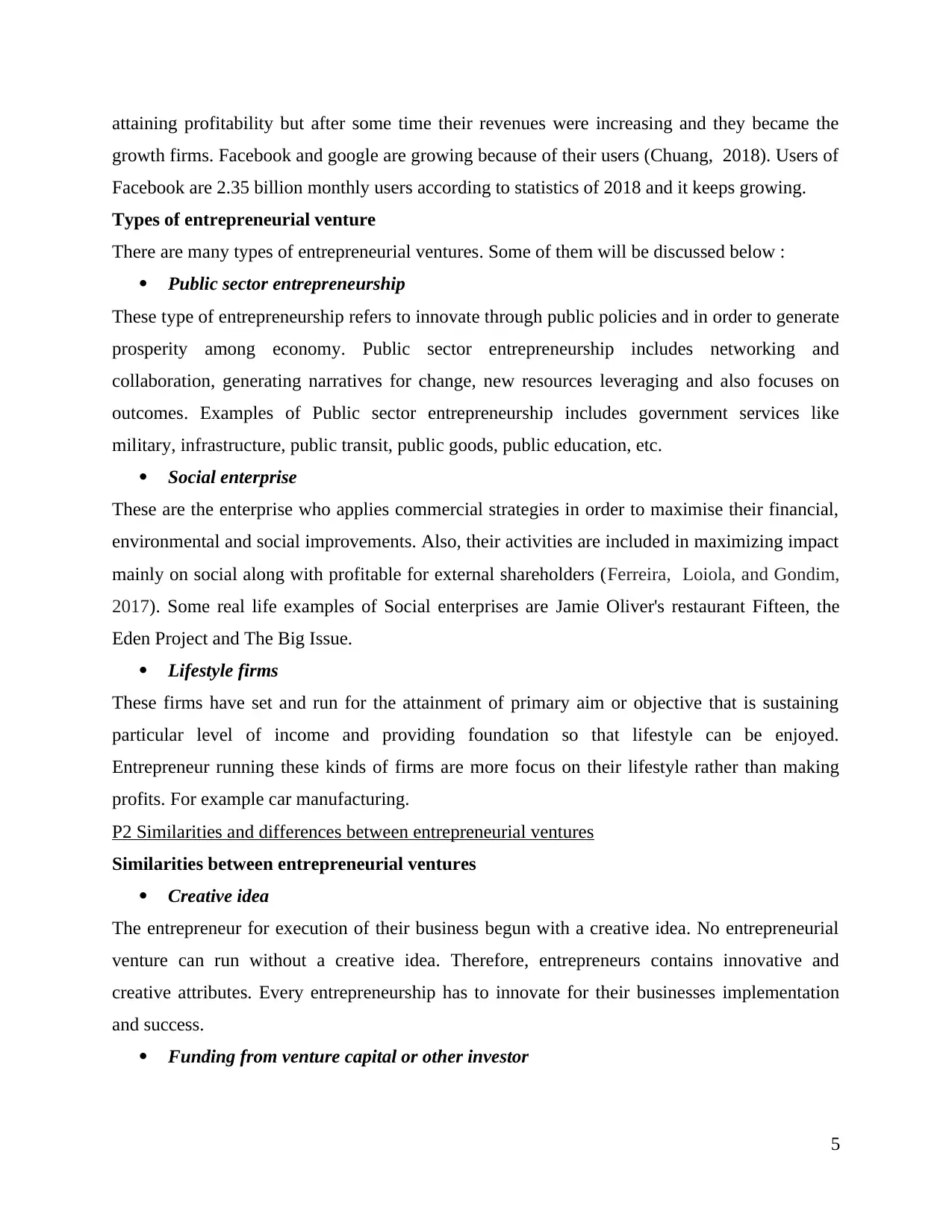
attaining profitability but after some time their revenues were increasing and they became the
growth firms. Facebook and google are growing because of their users (Chuang, 2018). Users of
Facebook are 2.35 billion monthly users according to statistics of 2018 and it keeps growing.
Types of entrepreneurial venture
There are many types of entrepreneurial ventures. Some of them will be discussed below :
Public sector entrepreneurship
These type of entrepreneurship refers to innovate through public policies and in order to generate
prosperity among economy. Public sector entrepreneurship includes networking and
collaboration, generating narratives for change, new resources leveraging and also focuses on
outcomes. Examples of Public sector entrepreneurship includes government services like
military, infrastructure, public transit, public goods, public education, etc.
Social enterprise
These are the enterprise who applies commercial strategies in order to maximise their financial,
environmental and social improvements. Also, their activities are included in maximizing impact
mainly on social along with profitable for external shareholders (Ferreira, Loiola, and Gondim,
2017). Some real life examples of Social enterprises are Jamie Oliver's restaurant Fifteen, the
Eden Project and The Big Issue.
Lifestyle firms
These firms have set and run for the attainment of primary aim or objective that is sustaining
particular level of income and providing foundation so that lifestyle can be enjoyed.
Entrepreneur running these kinds of firms are more focus on their lifestyle rather than making
profits. For example car manufacturing.
P2 Similarities and differences between entrepreneurial ventures
Similarities between entrepreneurial ventures
Creative idea
The entrepreneur for execution of their business begun with a creative idea. No entrepreneurial
venture can run without a creative idea. Therefore, entrepreneurs contains innovative and
creative attributes. Every entrepreneurship has to innovate for their businesses implementation
and success.
Funding from venture capital or other investor
5
growth firms. Facebook and google are growing because of their users (Chuang, 2018). Users of
Facebook are 2.35 billion monthly users according to statistics of 2018 and it keeps growing.
Types of entrepreneurial venture
There are many types of entrepreneurial ventures. Some of them will be discussed below :
Public sector entrepreneurship
These type of entrepreneurship refers to innovate through public policies and in order to generate
prosperity among economy. Public sector entrepreneurship includes networking and
collaboration, generating narratives for change, new resources leveraging and also focuses on
outcomes. Examples of Public sector entrepreneurship includes government services like
military, infrastructure, public transit, public goods, public education, etc.
Social enterprise
These are the enterprise who applies commercial strategies in order to maximise their financial,
environmental and social improvements. Also, their activities are included in maximizing impact
mainly on social along with profitable for external shareholders (Ferreira, Loiola, and Gondim,
2017). Some real life examples of Social enterprises are Jamie Oliver's restaurant Fifteen, the
Eden Project and The Big Issue.
Lifestyle firms
These firms have set and run for the attainment of primary aim or objective that is sustaining
particular level of income and providing foundation so that lifestyle can be enjoyed.
Entrepreneur running these kinds of firms are more focus on their lifestyle rather than making
profits. For example car manufacturing.
P2 Similarities and differences between entrepreneurial ventures
Similarities between entrepreneurial ventures
Creative idea
The entrepreneur for execution of their business begun with a creative idea. No entrepreneurial
venture can run without a creative idea. Therefore, entrepreneurs contains innovative and
creative attributes. Every entrepreneurship has to innovate for their businesses implementation
and success.
Funding from venture capital or other investor
5
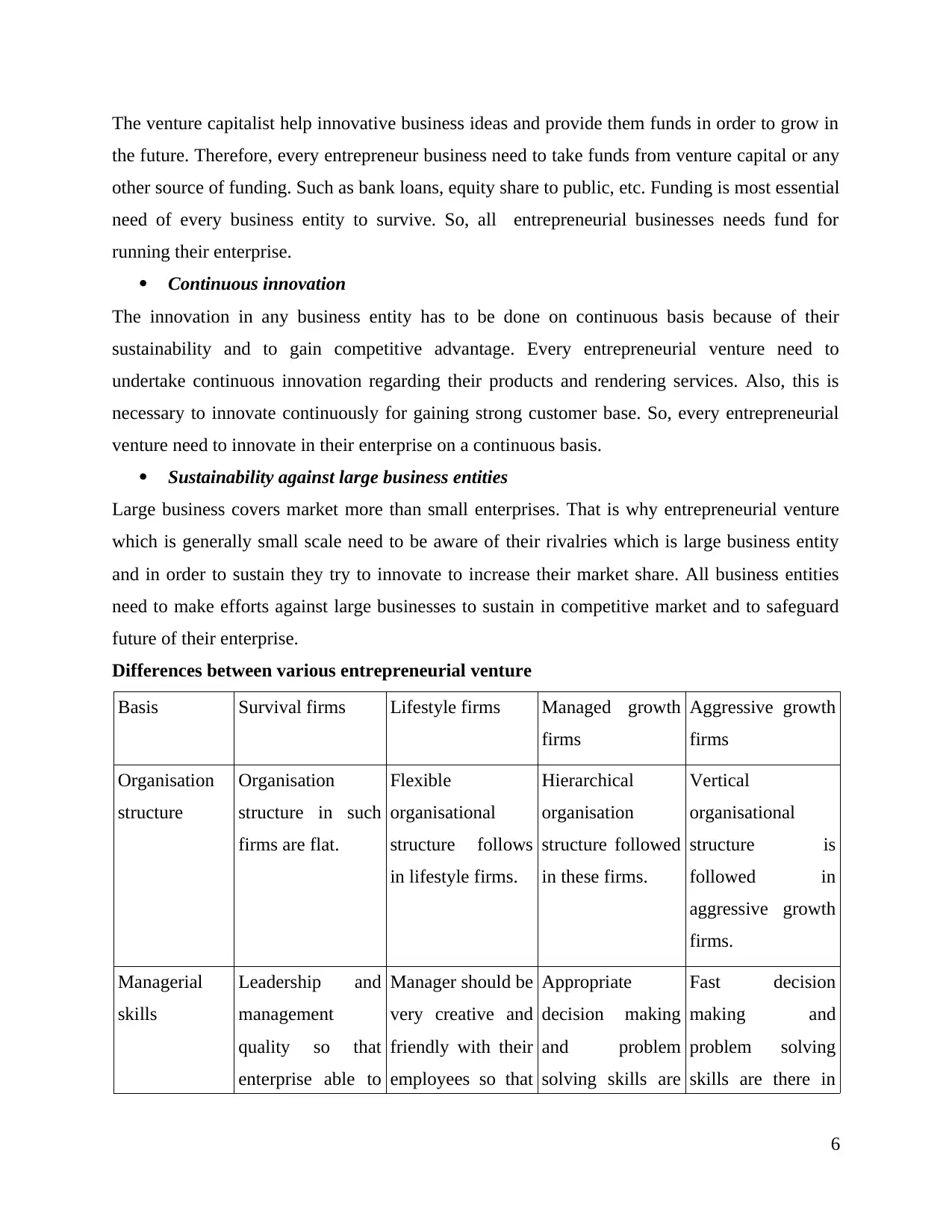
The venture capitalist help innovative business ideas and provide them funds in order to grow in
the future. Therefore, every entrepreneur business need to take funds from venture capital or any
other source of funding. Such as bank loans, equity share to public, etc. Funding is most essential
need of every business entity to survive. So, all entrepreneurial businesses needs fund for
running their enterprise.
Continuous innovation
The innovation in any business entity has to be done on continuous basis because of their
sustainability and to gain competitive advantage. Every entrepreneurial venture need to
undertake continuous innovation regarding their products and rendering services. Also, this is
necessary to innovate continuously for gaining strong customer base. So, every entrepreneurial
venture need to innovate in their enterprise on a continuous basis.
Sustainability against large business entities
Large business covers market more than small enterprises. That is why entrepreneurial venture
which is generally small scale need to be aware of their rivalries which is large business entity
and in order to sustain they try to innovate to increase their market share. All business entities
need to make efforts against large businesses to sustain in competitive market and to safeguard
future of their enterprise.
Differences between various entrepreneurial venture
Basis Survival firms Lifestyle firms Managed growth
firms
Aggressive growth
firms
Organisation
structure
Organisation
structure in such
firms are flat.
Flexible
organisational
structure follows
in lifestyle firms.
Hierarchical
organisation
structure followed
in these firms.
Vertical
organisational
structure is
followed in
aggressive growth
firms.
Managerial
skills
Leadership and
management
quality so that
enterprise able to
Manager should be
very creative and
friendly with their
employees so that
Appropriate
decision making
and problem
solving skills are
Fast decision
making and
problem solving
skills are there in
6
the future. Therefore, every entrepreneur business need to take funds from venture capital or any
other source of funding. Such as bank loans, equity share to public, etc. Funding is most essential
need of every business entity to survive. So, all entrepreneurial businesses needs fund for
running their enterprise.
Continuous innovation
The innovation in any business entity has to be done on continuous basis because of their
sustainability and to gain competitive advantage. Every entrepreneurial venture need to
undertake continuous innovation regarding their products and rendering services. Also, this is
necessary to innovate continuously for gaining strong customer base. So, every entrepreneurial
venture need to innovate in their enterprise on a continuous basis.
Sustainability against large business entities
Large business covers market more than small enterprises. That is why entrepreneurial venture
which is generally small scale need to be aware of their rivalries which is large business entity
and in order to sustain they try to innovate to increase their market share. All business entities
need to make efforts against large businesses to sustain in competitive market and to safeguard
future of their enterprise.
Differences between various entrepreneurial venture
Basis Survival firms Lifestyle firms Managed growth
firms
Aggressive growth
firms
Organisation
structure
Organisation
structure in such
firms are flat.
Flexible
organisational
structure follows
in lifestyle firms.
Hierarchical
organisation
structure followed
in these firms.
Vertical
organisational
structure is
followed in
aggressive growth
firms.
Managerial
skills
Leadership and
management
quality so that
enterprise able to
Manager should be
very creative and
friendly with their
employees so that
Appropriate
decision making
and problem
solving skills are
Fast decision
making and
problem solving
skills are there in
6
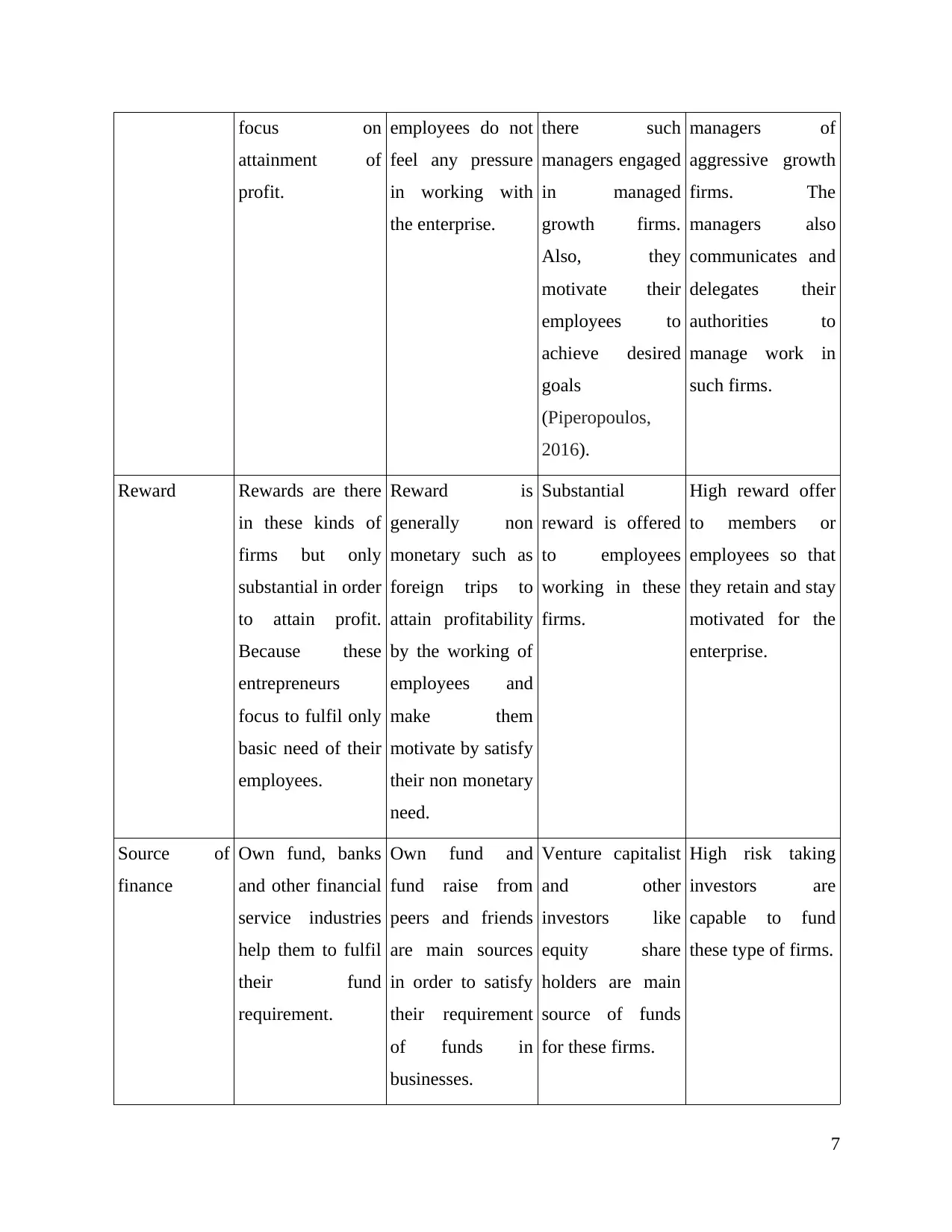
focus on
attainment of
profit.
employees do not
feel any pressure
in working with
the enterprise.
there such
managers engaged
in managed
growth firms.
Also, they
motivate their
employees to
achieve desired
goals
(Piperopoulos,
2016).
managers of
aggressive growth
firms. The
managers also
communicates and
delegates their
authorities to
manage work in
such firms.
Reward Rewards are there
in these kinds of
firms but only
substantial in order
to attain profit.
Because these
entrepreneurs
focus to fulfil only
basic need of their
employees.
Reward is
generally non
monetary such as
foreign trips to
attain profitability
by the working of
employees and
make them
motivate by satisfy
their non monetary
need.
Substantial
reward is offered
to employees
working in these
firms.
High reward offer
to members or
employees so that
they retain and stay
motivated for the
enterprise.
Source of
finance
Own fund, banks
and other financial
service industries
help them to fulfil
their fund
requirement.
Own fund and
fund raise from
peers and friends
are main sources
in order to satisfy
their requirement
of funds in
businesses.
Venture capitalist
and other
investors like
equity share
holders are main
source of funds
for these firms.
High risk taking
investors are
capable to fund
these type of firms.
7
attainment of
profit.
employees do not
feel any pressure
in working with
the enterprise.
there such
managers engaged
in managed
growth firms.
Also, they
motivate their
employees to
achieve desired
goals
(Piperopoulos,
2016).
managers of
aggressive growth
firms. The
managers also
communicates and
delegates their
authorities to
manage work in
such firms.
Reward Rewards are there
in these kinds of
firms but only
substantial in order
to attain profit.
Because these
entrepreneurs
focus to fulfil only
basic need of their
employees.
Reward is
generally non
monetary such as
foreign trips to
attain profitability
by the working of
employees and
make them
motivate by satisfy
their non monetary
need.
Substantial
reward is offered
to employees
working in these
firms.
High reward offer
to members or
employees so that
they retain and stay
motivated for the
enterprise.
Source of
finance
Own fund, banks
and other financial
service industries
help them to fulfil
their fund
requirement.
Own fund and
fund raise from
peers and friends
are main sources
in order to satisfy
their requirement
of funds in
businesses.
Venture capitalist
and other
investors like
equity share
holders are main
source of funds
for these firms.
High risk taking
investors are
capable to fund
these type of firms.
7
Paraphrase This Document
Need a fresh take? Get an instant paraphrase of this document with our AI Paraphraser
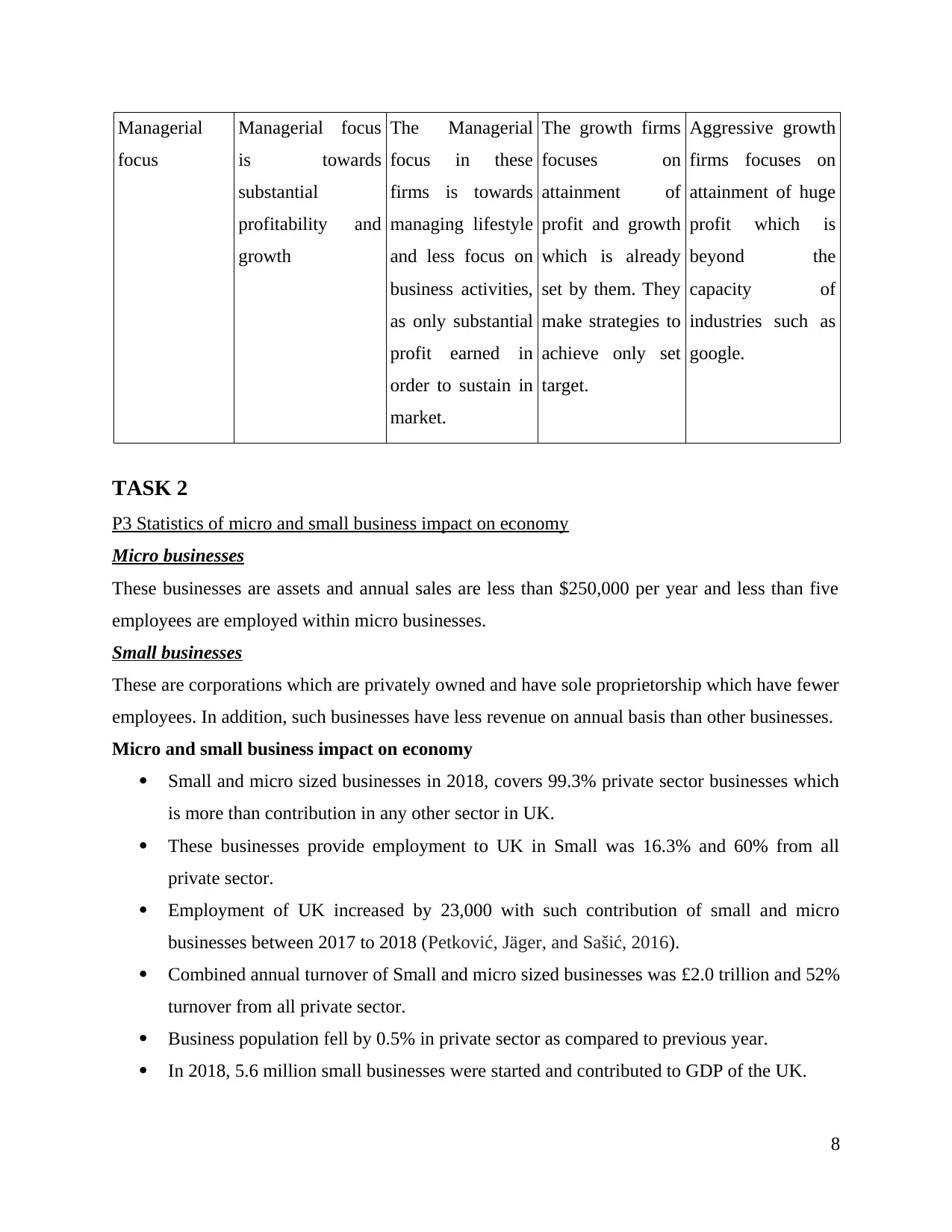
Managerial
focus
Managerial focus
is towards
substantial
profitability and
growth
The Managerial
focus in these
firms is towards
managing lifestyle
and less focus on
business activities,
as only substantial
profit earned in
order to sustain in
market.
The growth firms
focuses on
attainment of
profit and growth
which is already
set by them. They
make strategies to
achieve only set
target.
Aggressive growth
firms focuses on
attainment of huge
profit which is
beyond the
capacity of
industries such as
google.
TASK 2
P3 Statistics of micro and small business impact on economy
Micro businesses
These businesses are assets and annual sales are less than $250,000 per year and less than five
employees are employed within micro businesses.
Small businesses
These are corporations which are privately owned and have sole proprietorship which have fewer
employees. In addition, such businesses have less revenue on annual basis than other businesses.
Micro and small business impact on economy
Small and micro sized businesses in 2018, covers 99.3% private sector businesses which
is more than contribution in any other sector in UK.
These businesses provide employment to UK in Small was 16.3% and 60% from all
private sector.
Employment of UK increased by 23,000 with such contribution of small and micro
businesses between 2017 to 2018 (Petković, Jäger, and Sašić, 2016).
Combined annual turnover of Small and micro sized businesses was £2.0 trillion and 52%
turnover from all private sector.
Business population fell by 0.5% in private sector as compared to previous year.
In 2018, 5.6 million small businesses were started and contributed to GDP of the UK.
8
focus
Managerial focus
is towards
substantial
profitability and
growth
The Managerial
focus in these
firms is towards
managing lifestyle
and less focus on
business activities,
as only substantial
profit earned in
order to sustain in
market.
The growth firms
focuses on
attainment of
profit and growth
which is already
set by them. They
make strategies to
achieve only set
target.
Aggressive growth
firms focuses on
attainment of huge
profit which is
beyond the
capacity of
industries such as
google.
TASK 2
P3 Statistics of micro and small business impact on economy
Micro businesses
These businesses are assets and annual sales are less than $250,000 per year and less than five
employees are employed within micro businesses.
Small businesses
These are corporations which are privately owned and have sole proprietorship which have fewer
employees. In addition, such businesses have less revenue on annual basis than other businesses.
Micro and small business impact on economy
Small and micro sized businesses in 2018, covers 99.3% private sector businesses which
is more than contribution in any other sector in UK.
These businesses provide employment to UK in Small was 16.3% and 60% from all
private sector.
Employment of UK increased by 23,000 with such contribution of small and micro
businesses between 2017 to 2018 (Petković, Jäger, and Sašić, 2016).
Combined annual turnover of Small and micro sized businesses was £2.0 trillion and 52%
turnover from all private sector.
Business population fell by 0.5% in private sector as compared to previous year.
In 2018, 5.6 million small businesses were started and contributed to GDP of the UK.
8

P4 Importance of small business and start ups to the growth of social economy
A social economy is formulated by a diversity of organisations and enterprise like,
associations, cooperatives, foundations, paritarian institutions, mutuals, social enterprises and
shares common value and features. Small Businesses and start ups impact social economy
9
F
igure : Profits of SME's
(Source : UK SME Data, Stats & Charts, 2019)
Fi
gure : Growth in UK businesses
(Source : UK SME Data, Stats & Charts, 2019)
A social economy is formulated by a diversity of organisations and enterprise like,
associations, cooperatives, foundations, paritarian institutions, mutuals, social enterprises and
shares common value and features. Small Businesses and start ups impact social economy
9
F
igure : Profits of SME's
(Source : UK SME Data, Stats & Charts, 2019)
Fi
gure : Growth in UK businesses
(Source : UK SME Data, Stats & Charts, 2019)
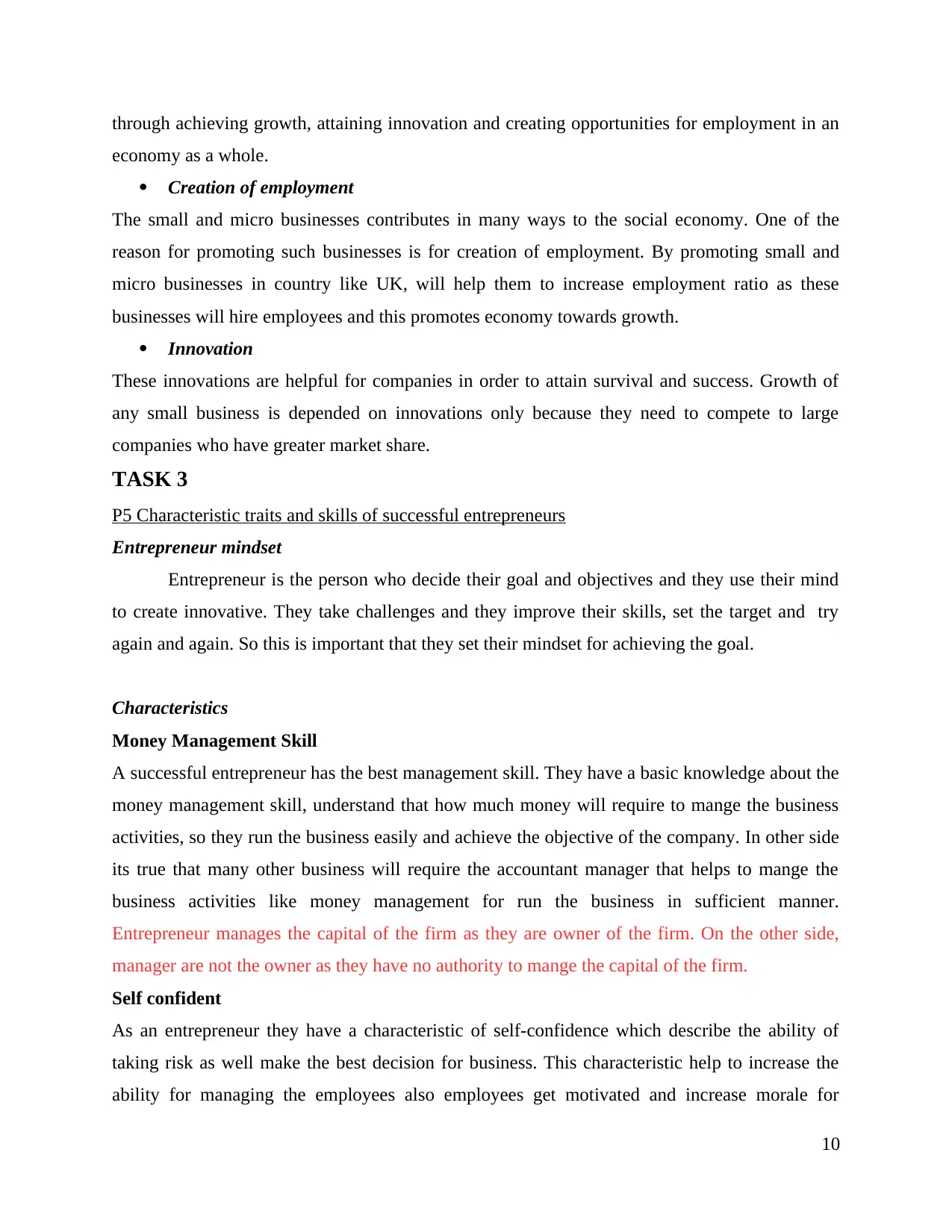
through achieving growth, attaining innovation and creating opportunities for employment in an
economy as a whole.
Creation of employment
The small and micro businesses contributes in many ways to the social economy. One of the
reason for promoting such businesses is for creation of employment. By promoting small and
micro businesses in country like UK, will help them to increase employment ratio as these
businesses will hire employees and this promotes economy towards growth.
Innovation
These innovations are helpful for companies in order to attain survival and success. Growth of
any small business is depended on innovations only because they need to compete to large
companies who have greater market share.
TASK 3
P5 Characteristic traits and skills of successful entrepreneurs
Entrepreneur mindset
Entrepreneur is the person who decide their goal and objectives and they use their mind
to create innovative. They take challenges and they improve their skills, set the target and try
again and again. So this is important that they set their mindset for achieving the goal.
Characteristics
Money Management Skill
A successful entrepreneur has the best management skill. They have a basic knowledge about the
money management skill, understand that how much money will require to mange the business
activities, so they run the business easily and achieve the objective of the company. In other side
its true that many other business will require the accountant manager that helps to mange the
business activities like money management for run the business in sufficient manner.
Entrepreneur manages the capital of the firm as they are owner of the firm. On the other side,
manager are not the owner as they have no authority to mange the capital of the firm.
Self confident
As an entrepreneur they have a characteristic of self-confidence which describe the ability of
taking risk as well make the best decision for business. This characteristic help to increase the
ability for managing the employees also employees get motivated and increase morale for
10
economy as a whole.
Creation of employment
The small and micro businesses contributes in many ways to the social economy. One of the
reason for promoting such businesses is for creation of employment. By promoting small and
micro businesses in country like UK, will help them to increase employment ratio as these
businesses will hire employees and this promotes economy towards growth.
Innovation
These innovations are helpful for companies in order to attain survival and success. Growth of
any small business is depended on innovations only because they need to compete to large
companies who have greater market share.
TASK 3
P5 Characteristic traits and skills of successful entrepreneurs
Entrepreneur mindset
Entrepreneur is the person who decide their goal and objectives and they use their mind
to create innovative. They take challenges and they improve their skills, set the target and try
again and again. So this is important that they set their mindset for achieving the goal.
Characteristics
Money Management Skill
A successful entrepreneur has the best management skill. They have a basic knowledge about the
money management skill, understand that how much money will require to mange the business
activities, so they run the business easily and achieve the objective of the company. In other side
its true that many other business will require the accountant manager that helps to mange the
business activities like money management for run the business in sufficient manner.
Entrepreneur manages the capital of the firm as they are owner of the firm. On the other side,
manager are not the owner as they have no authority to mange the capital of the firm.
Self confident
As an entrepreneur they have a characteristic of self-confidence which describe the ability of
taking risk as well make the best decision for business. This characteristic help to increase the
ability for managing the employees also employees get motivated and increase morale for
10
Secure Best Marks with AI Grader
Need help grading? Try our AI Grader for instant feedback on your assignments.
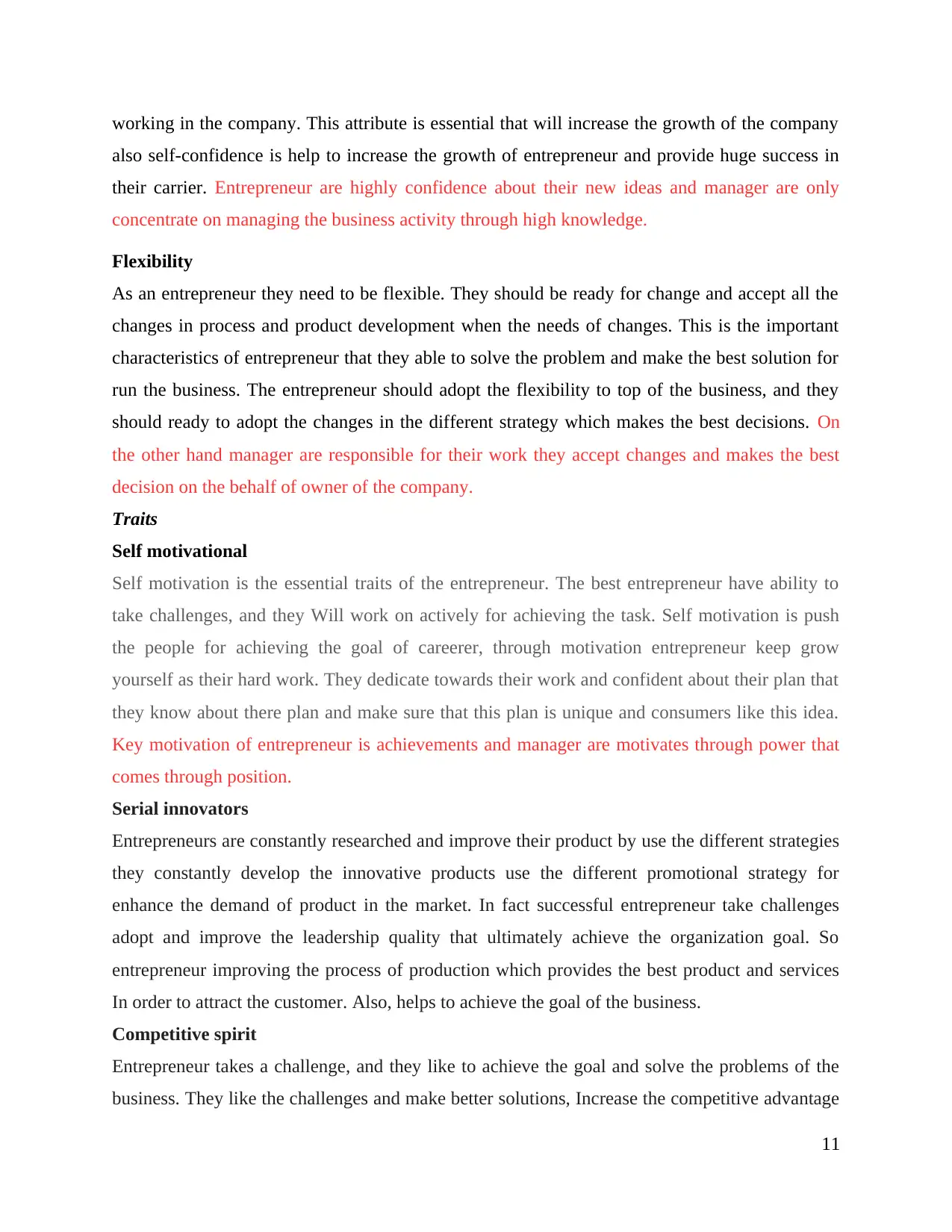
working in the company. This attribute is essential that will increase the growth of the company
also self-confidence is help to increase the growth of entrepreneur and provide huge success in
their carrier. Entrepreneur are highly confidence about their new ideas and manager are only
concentrate on managing the business activity through high knowledge.
Flexibility
As an entrepreneur they need to be flexible. They should be ready for change and accept all the
changes in process and product development when the needs of changes. This is the important
characteristics of entrepreneur that they able to solve the problem and make the best solution for
run the business. The entrepreneur should adopt the flexibility to top of the business, and they
should ready to adopt the changes in the different strategy which makes the best decisions. On
the other hand manager are responsible for their work they accept changes and makes the best
decision on the behalf of owner of the company.
Traits
Self motivational
Self motivation is the essential traits of the entrepreneur. The best entrepreneur have ability to
take challenges, and they Will work on actively for achieving the task. Self motivation is push
the people for achieving the goal of careerer, through motivation entrepreneur keep grow
yourself as their hard work. They dedicate towards their work and confident about their plan that
they know about there plan and make sure that this plan is unique and consumers like this idea.
Key motivation of entrepreneur is achievements and manager are motivates through power that
comes through position.
Serial innovators
Entrepreneurs are constantly researched and improve their product by use the different strategies
they constantly develop the innovative products use the different promotional strategy for
enhance the demand of product in the market. In fact successful entrepreneur take challenges
adopt and improve the leadership quality that ultimately achieve the organization goal. So
entrepreneur improving the process of production which provides the best product and services
In order to attract the customer. Also, helps to achieve the goal of the business.
Competitive spirit
Entrepreneur takes a challenge, and they like to achieve the goal and solve the problems of the
business. They like the challenges and make better solutions, Increase the competitive advantage
11
also self-confidence is help to increase the growth of entrepreneur and provide huge success in
their carrier. Entrepreneur are highly confidence about their new ideas and manager are only
concentrate on managing the business activity through high knowledge.
Flexibility
As an entrepreneur they need to be flexible. They should be ready for change and accept all the
changes in process and product development when the needs of changes. This is the important
characteristics of entrepreneur that they able to solve the problem and make the best solution for
run the business. The entrepreneur should adopt the flexibility to top of the business, and they
should ready to adopt the changes in the different strategy which makes the best decisions. On
the other hand manager are responsible for their work they accept changes and makes the best
decision on the behalf of owner of the company.
Traits
Self motivational
Self motivation is the essential traits of the entrepreneur. The best entrepreneur have ability to
take challenges, and they Will work on actively for achieving the task. Self motivation is push
the people for achieving the goal of careerer, through motivation entrepreneur keep grow
yourself as their hard work. They dedicate towards their work and confident about their plan that
they know about there plan and make sure that this plan is unique and consumers like this idea.
Key motivation of entrepreneur is achievements and manager are motivates through power that
comes through position.
Serial innovators
Entrepreneurs are constantly researched and improve their product by use the different strategies
they constantly develop the innovative products use the different promotional strategy for
enhance the demand of product in the market. In fact successful entrepreneur take challenges
adopt and improve the leadership quality that ultimately achieve the organization goal. So
entrepreneur improving the process of production which provides the best product and services
In order to attract the customer. Also, helps to achieve the goal of the business.
Competitive spirit
Entrepreneur takes a challenge, and they like to achieve the goal and solve the problems of the
business. They like the challenges and make better solutions, Increase the competitive advantage
11
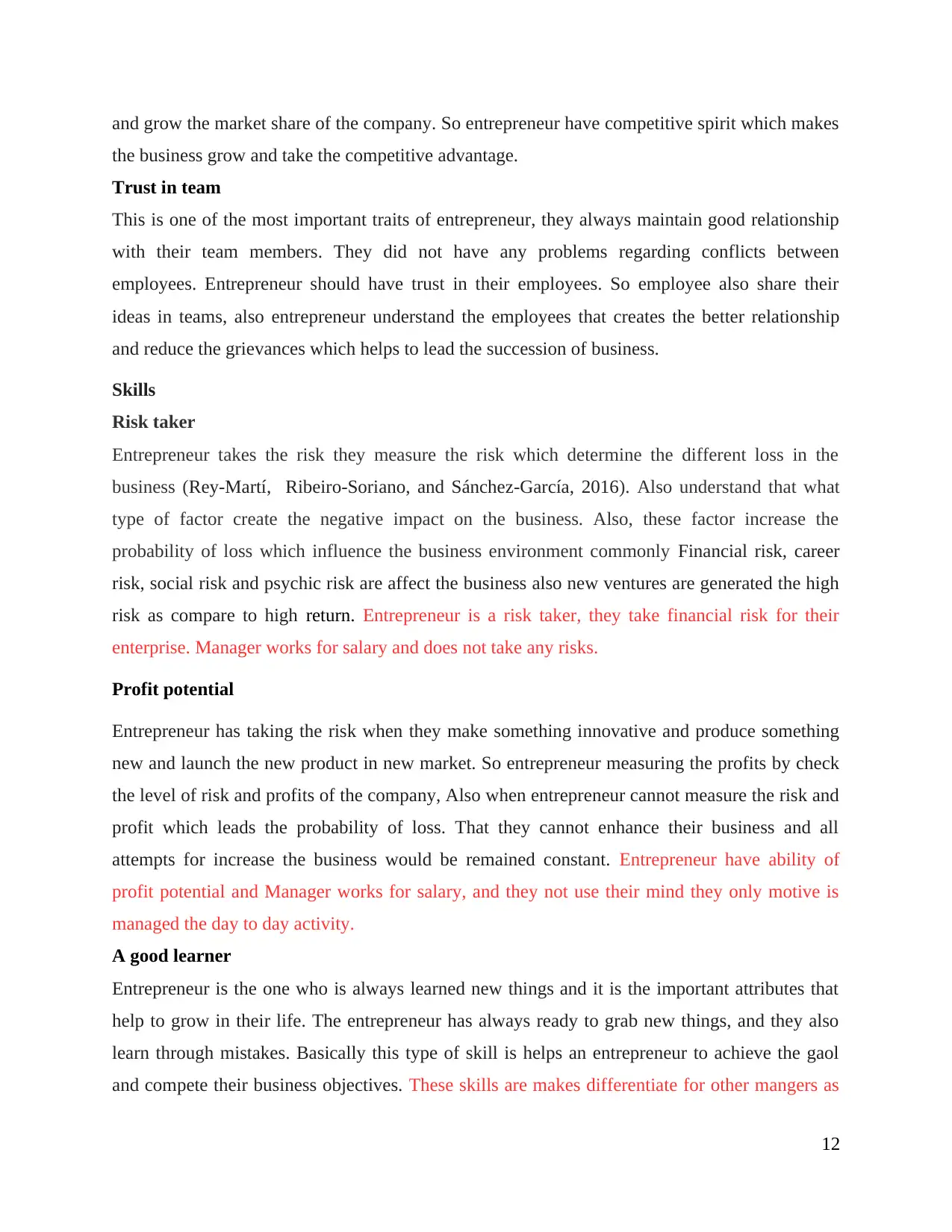
and grow the market share of the company. So entrepreneur have competitive spirit which makes
the business grow and take the competitive advantage.
Trust in team
This is one of the most important traits of entrepreneur, they always maintain good relationship
with their team members. They did not have any problems regarding conflicts between
employees. Entrepreneur should have trust in their employees. So employee also share their
ideas in teams, also entrepreneur understand the employees that creates the better relationship
and reduce the grievances which helps to lead the succession of business.
Skills
Risk taker
Entrepreneur takes the risk they measure the risk which determine the different loss in the
business (Rey-Martí, Ribeiro-Soriano, and Sánchez-García, 2016). Also understand that what
type of factor create the negative impact on the business. Also, these factor increase the
probability of loss which influence the business environment commonly Financial risk, career
risk, social risk and psychic risk are affect the business also new ventures are generated the high
risk as compare to high return. Entrepreneur is a risk taker, they take financial risk for their
enterprise. Manager works for salary and does not take any risks.
Profit potential
Entrepreneur has taking the risk when they make something innovative and produce something
new and launch the new product in new market. So entrepreneur measuring the profits by check
the level of risk and profits of the company, Also when entrepreneur cannot measure the risk and
profit which leads the probability of loss. That they cannot enhance their business and all
attempts for increase the business would be remained constant. Entrepreneur have ability of
profit potential and Manager works for salary, and they not use their mind they only motive is
managed the day to day activity.
A good learner
Entrepreneur is the one who is always learned new things and it is the important attributes that
help to grow in their life. The entrepreneur has always ready to grab new things, and they also
learn through mistakes. Basically this type of skill is helps an entrepreneur to achieve the gaol
and compete their business objectives. These skills are makes differentiate for other mangers as
12
the business grow and take the competitive advantage.
Trust in team
This is one of the most important traits of entrepreneur, they always maintain good relationship
with their team members. They did not have any problems regarding conflicts between
employees. Entrepreneur should have trust in their employees. So employee also share their
ideas in teams, also entrepreneur understand the employees that creates the better relationship
and reduce the grievances which helps to lead the succession of business.
Skills
Risk taker
Entrepreneur takes the risk they measure the risk which determine the different loss in the
business (Rey-Martí, Ribeiro-Soriano, and Sánchez-García, 2016). Also understand that what
type of factor create the negative impact on the business. Also, these factor increase the
probability of loss which influence the business environment commonly Financial risk, career
risk, social risk and psychic risk are affect the business also new ventures are generated the high
risk as compare to high return. Entrepreneur is a risk taker, they take financial risk for their
enterprise. Manager works for salary and does not take any risks.
Profit potential
Entrepreneur has taking the risk when they make something innovative and produce something
new and launch the new product in new market. So entrepreneur measuring the profits by check
the level of risk and profits of the company, Also when entrepreneur cannot measure the risk and
profit which leads the probability of loss. That they cannot enhance their business and all
attempts for increase the business would be remained constant. Entrepreneur have ability of
profit potential and Manager works for salary, and they not use their mind they only motive is
managed the day to day activity.
A good learner
Entrepreneur is the one who is always learned new things and it is the important attributes that
help to grow in their life. The entrepreneur has always ready to grab new things, and they also
learn through mistakes. Basically this type of skill is helps an entrepreneur to achieve the gaol
and compete their business objectives. These skills are makes differentiate for other mangers as
12
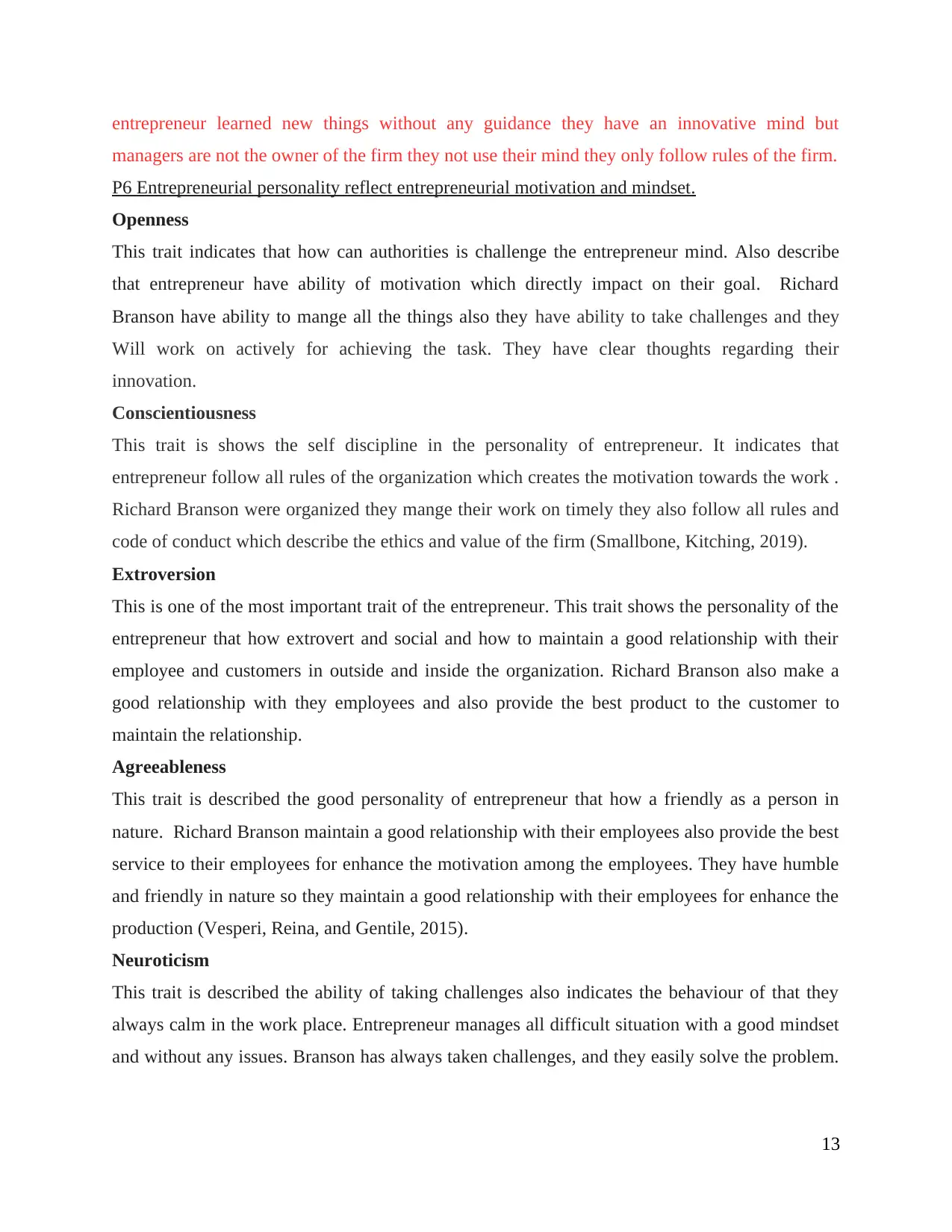
entrepreneur learned new things without any guidance they have an innovative mind but
managers are not the owner of the firm they not use their mind they only follow rules of the firm.
P6 Entrepreneurial personality reflect entrepreneurial motivation and mindset.
Openness
This trait indicates that how can authorities is challenge the entrepreneur mind. Also describe
that entrepreneur have ability of motivation which directly impact on their goal. Richard
Branson have ability to mange all the things also they have ability to take challenges and they
Will work on actively for achieving the task. They have clear thoughts regarding their
innovation.
Conscientiousness
This trait is shows the self discipline in the personality of entrepreneur. It indicates that
entrepreneur follow all rules of the organization which creates the motivation towards the work .
Richard Branson were organized they mange their work on timely they also follow all rules and
code of conduct which describe the ethics and value of the firm (Smallbone, Kitching, 2019).
Extroversion
This is one of the most important trait of the entrepreneur. This trait shows the personality of the
entrepreneur that how extrovert and social and how to maintain a good relationship with their
employee and customers in outside and inside the organization. Richard Branson also make a
good relationship with they employees and also provide the best product to the customer to
maintain the relationship.
Agreeableness
This trait is described the good personality of entrepreneur that how a friendly as a person in
nature. Richard Branson maintain a good relationship with their employees also provide the best
service to their employees for enhance the motivation among the employees. They have humble
and friendly in nature so they maintain a good relationship with their employees for enhance the
production (Vesperi, Reina, and Gentile, 2015).
Neuroticism
This trait is described the ability of taking challenges also indicates the behaviour of that they
always calm in the work place. Entrepreneur manages all difficult situation with a good mindset
and without any issues. Branson has always taken challenges, and they easily solve the problem.
13
managers are not the owner of the firm they not use their mind they only follow rules of the firm.
P6 Entrepreneurial personality reflect entrepreneurial motivation and mindset.
Openness
This trait indicates that how can authorities is challenge the entrepreneur mind. Also describe
that entrepreneur have ability of motivation which directly impact on their goal. Richard
Branson have ability to mange all the things also they have ability to take challenges and they
Will work on actively for achieving the task. They have clear thoughts regarding their
innovation.
Conscientiousness
This trait is shows the self discipline in the personality of entrepreneur. It indicates that
entrepreneur follow all rules of the organization which creates the motivation towards the work .
Richard Branson were organized they mange their work on timely they also follow all rules and
code of conduct which describe the ethics and value of the firm (Smallbone, Kitching, 2019).
Extroversion
This is one of the most important trait of the entrepreneur. This trait shows the personality of the
entrepreneur that how extrovert and social and how to maintain a good relationship with their
employee and customers in outside and inside the organization. Richard Branson also make a
good relationship with they employees and also provide the best product to the customer to
maintain the relationship.
Agreeableness
This trait is described the good personality of entrepreneur that how a friendly as a person in
nature. Richard Branson maintain a good relationship with their employees also provide the best
service to their employees for enhance the motivation among the employees. They have humble
and friendly in nature so they maintain a good relationship with their employees for enhance the
production (Vesperi, Reina, and Gentile, 2015).
Neuroticism
This trait is described the ability of taking challenges also indicates the behaviour of that they
always calm in the work place. Entrepreneur manages all difficult situation with a good mindset
and without any issues. Branson has always taken challenges, and they easily solve the problem.
13
Paraphrase This Document
Need a fresh take? Get an instant paraphrase of this document with our AI Paraphraser
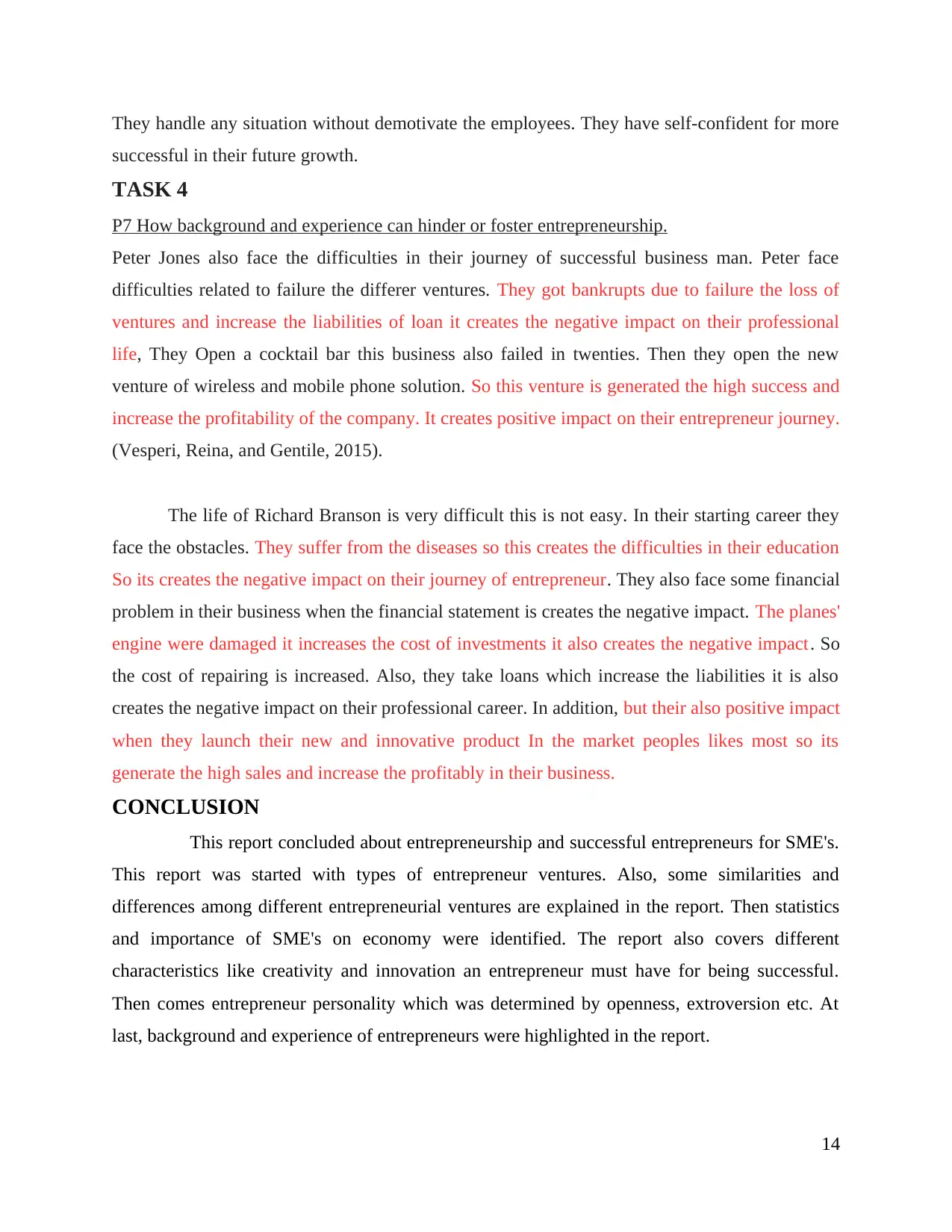
They handle any situation without demotivate the employees. They have self-confident for more
successful in their future growth.
TASK 4
P7 How background and experience can hinder or foster entrepreneurship.
Peter Jones also face the difficulties in their journey of successful business man. Peter face
difficulties related to failure the differer ventures. They got bankrupts due to failure the loss of
ventures and increase the liabilities of loan it creates the negative impact on their professional
life, They Open a cocktail bar this business also failed in twenties. Then they open the new
venture of wireless and mobile phone solution. So this venture is generated the high success and
increase the profitability of the company. It creates positive impact on their entrepreneur journey.
(Vesperi, Reina, and Gentile, 2015).
The life of Richard Branson is very difficult this is not easy. In their starting career they
face the obstacles. They suffer from the diseases so this creates the difficulties in their education
So its creates the negative impact on their journey of entrepreneur. They also face some financial
problem in their business when the financial statement is creates the negative impact. The planes'
engine were damaged it increases the cost of investments it also creates the negative impact. So
the cost of repairing is increased. Also, they take loans which increase the liabilities it is also
creates the negative impact on their professional career. In addition, but their also positive impact
when they launch their new and innovative product In the market peoples likes most so its
generate the high sales and increase the profitably in their business.
CONCLUSION
This report concluded about entrepreneurship and successful entrepreneurs for SME's.
This report was started with types of entrepreneur ventures. Also, some similarities and
differences among different entrepreneurial ventures are explained in the report. Then statistics
and importance of SME's on economy were identified. The report also covers different
characteristics like creativity and innovation an entrepreneur must have for being successful.
Then comes entrepreneur personality which was determined by openness, extroversion etc. At
last, background and experience of entrepreneurs were highlighted in the report.
14
successful in their future growth.
TASK 4
P7 How background and experience can hinder or foster entrepreneurship.
Peter Jones also face the difficulties in their journey of successful business man. Peter face
difficulties related to failure the differer ventures. They got bankrupts due to failure the loss of
ventures and increase the liabilities of loan it creates the negative impact on their professional
life, They Open a cocktail bar this business also failed in twenties. Then they open the new
venture of wireless and mobile phone solution. So this venture is generated the high success and
increase the profitability of the company. It creates positive impact on their entrepreneur journey.
(Vesperi, Reina, and Gentile, 2015).
The life of Richard Branson is very difficult this is not easy. In their starting career they
face the obstacles. They suffer from the diseases so this creates the difficulties in their education
So its creates the negative impact on their journey of entrepreneur. They also face some financial
problem in their business when the financial statement is creates the negative impact. The planes'
engine were damaged it increases the cost of investments it also creates the negative impact. So
the cost of repairing is increased. Also, they take loans which increase the liabilities it is also
creates the negative impact on their professional career. In addition, but their also positive impact
when they launch their new and innovative product In the market peoples likes most so its
generate the high sales and increase the profitably in their business.
CONCLUSION
This report concluded about entrepreneurship and successful entrepreneurs for SME's.
This report was started with types of entrepreneur ventures. Also, some similarities and
differences among different entrepreneurial ventures are explained in the report. Then statistics
and importance of SME's on economy were identified. The report also covers different
characteristics like creativity and innovation an entrepreneur must have for being successful.
Then comes entrepreneur personality which was determined by openness, extroversion etc. At
last, background and experience of entrepreneurs were highlighted in the report.
14
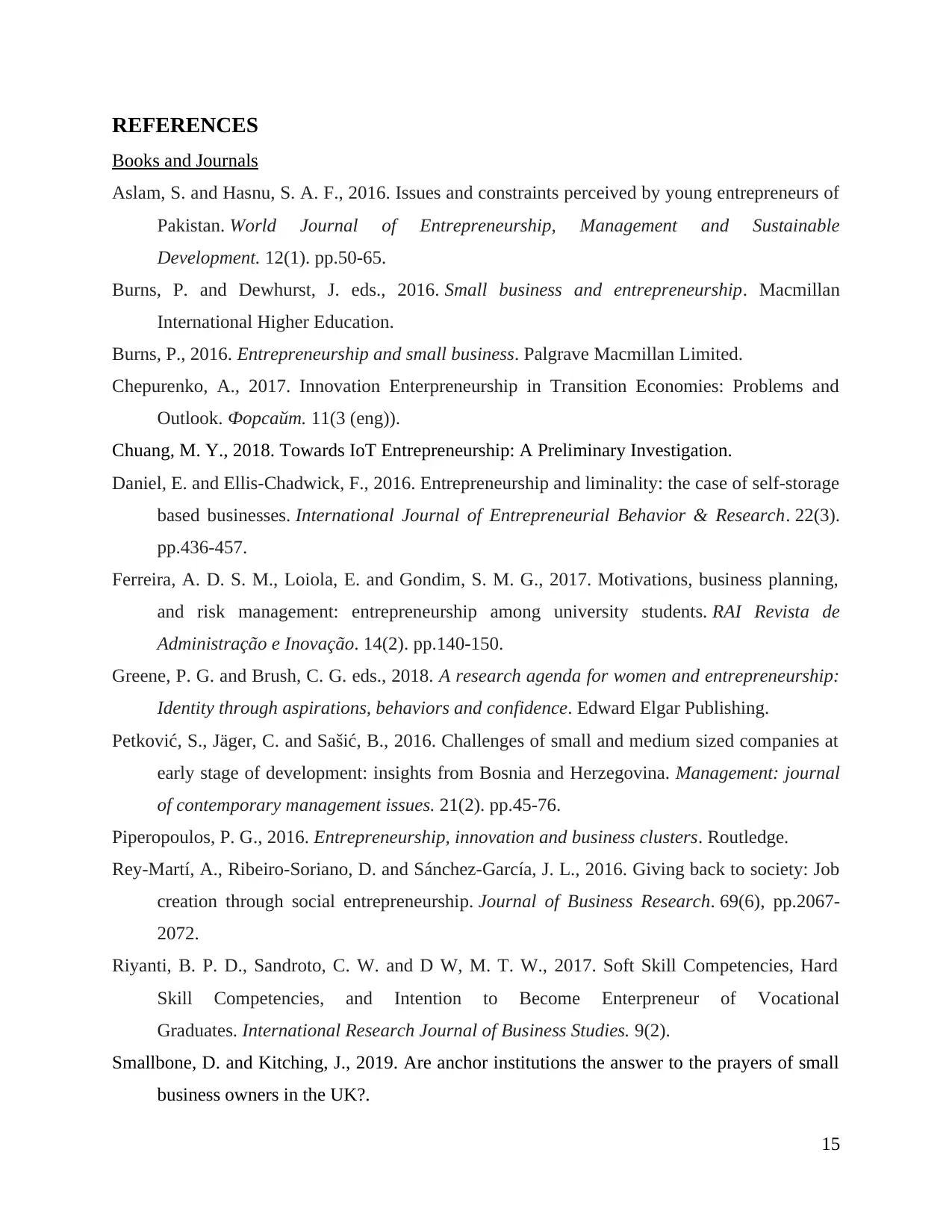
REFERENCES
Books and Journals
Aslam, S. and Hasnu, S. A. F., 2016. Issues and constraints perceived by young entrepreneurs of
Pakistan. World Journal of Entrepreneurship, Management and Sustainable
Development. 12(1). pp.50-65.
Burns, P. and Dewhurst, J. eds., 2016. Small business and entrepreneurship. Macmillan
International Higher Education.
Burns, P., 2016. Entrepreneurship and small business. Palgrave Macmillan Limited.
Chepurenko, A., 2017. Innovation Enterpreneurship in Transition Economies: Problems and
Outlook. Форсайт. 11(3 (eng)).
Chuang, M. Y., 2018. Towards IoT Entrepreneurship: A Preliminary Investigation.
Daniel, E. and Ellis-Chadwick, F., 2016. Entrepreneurship and liminality: the case of self-storage
based businesses. International Journal of Entrepreneurial Behavior & Research. 22(3).
pp.436-457.
Ferreira, A. D. S. M., Loiola, E. and Gondim, S. M. G., 2017. Motivations, business planning,
and risk management: entrepreneurship among university students. RAI Revista de
Administração e Inovação. 14(2). pp.140-150.
Greene, P. G. and Brush, C. G. eds., 2018. A research agenda for women and entrepreneurship:
Identity through aspirations, behaviors and confidence. Edward Elgar Publishing.
Petković, S., Jäger, C. and Sašić, B., 2016. Challenges of small and medium sized companies at
early stage of development: insights from Bosnia and Herzegovina. Management: journal
of contemporary management issues. 21(2). pp.45-76.
Piperopoulos, P. G., 2016. Entrepreneurship, innovation and business clusters. Routledge.
Rey-Martí, A., Ribeiro-Soriano, D. and Sánchez-García, J. L., 2016. Giving back to society: Job
creation through social entrepreneurship. Journal of Business Research. 69(6), pp.2067-
2072.
Riyanti, B. P. D., Sandroto, C. W. and D W, M. T. W., 2017. Soft Skill Competencies, Hard
Skill Competencies, and Intention to Become Enterpreneur of Vocational
Graduates. International Research Journal of Business Studies. 9(2).
Smallbone, D. and Kitching, J., 2019. Are anchor institutions the answer to the prayers of small
business owners in the UK?.
15
Books and Journals
Aslam, S. and Hasnu, S. A. F., 2016. Issues and constraints perceived by young entrepreneurs of
Pakistan. World Journal of Entrepreneurship, Management and Sustainable
Development. 12(1). pp.50-65.
Burns, P. and Dewhurst, J. eds., 2016. Small business and entrepreneurship. Macmillan
International Higher Education.
Burns, P., 2016. Entrepreneurship and small business. Palgrave Macmillan Limited.
Chepurenko, A., 2017. Innovation Enterpreneurship in Transition Economies: Problems and
Outlook. Форсайт. 11(3 (eng)).
Chuang, M. Y., 2018. Towards IoT Entrepreneurship: A Preliminary Investigation.
Daniel, E. and Ellis-Chadwick, F., 2016. Entrepreneurship and liminality: the case of self-storage
based businesses. International Journal of Entrepreneurial Behavior & Research. 22(3).
pp.436-457.
Ferreira, A. D. S. M., Loiola, E. and Gondim, S. M. G., 2017. Motivations, business planning,
and risk management: entrepreneurship among university students. RAI Revista de
Administração e Inovação. 14(2). pp.140-150.
Greene, P. G. and Brush, C. G. eds., 2018. A research agenda for women and entrepreneurship:
Identity through aspirations, behaviors and confidence. Edward Elgar Publishing.
Petković, S., Jäger, C. and Sašić, B., 2016. Challenges of small and medium sized companies at
early stage of development: insights from Bosnia and Herzegovina. Management: journal
of contemporary management issues. 21(2). pp.45-76.
Piperopoulos, P. G., 2016. Entrepreneurship, innovation and business clusters. Routledge.
Rey-Martí, A., Ribeiro-Soriano, D. and Sánchez-García, J. L., 2016. Giving back to society: Job
creation through social entrepreneurship. Journal of Business Research. 69(6), pp.2067-
2072.
Riyanti, B. P. D., Sandroto, C. W. and D W, M. T. W., 2017. Soft Skill Competencies, Hard
Skill Competencies, and Intention to Become Enterpreneur of Vocational
Graduates. International Research Journal of Business Studies. 9(2).
Smallbone, D. and Kitching, J., 2019. Are anchor institutions the answer to the prayers of small
business owners in the UK?.
15

Vesperi, W., Reina, R. and Gentile, T., 2015, September. Academic knowledge vs
enterpreneurship: the spin off way. In European Conference on Knowledge
Management(p. 828). Academic Conferences International Limited.
Online
Statistics for small business of UK. 2018. [Online]. Available through :
<https://www.expertmarket.co.uk/focus/15-surprising-statistics-for-uk-small-business>.
UK SME Data, Stats & Charts. 2019. [Online]. Available through :
<https://www.merchantsavvy.co.uk/uk-sme-data-stats-charts/>.
16
enterpreneurship: the spin off way. In European Conference on Knowledge
Management(p. 828). Academic Conferences International Limited.
Online
Statistics for small business of UK. 2018. [Online]. Available through :
<https://www.expertmarket.co.uk/focus/15-surprising-statistics-for-uk-small-business>.
UK SME Data, Stats & Charts. 2019. [Online]. Available through :
<https://www.merchantsavvy.co.uk/uk-sme-data-stats-charts/>.
16
1 out of 16
Related Documents
Your All-in-One AI-Powered Toolkit for Academic Success.
+13062052269
info@desklib.com
Available 24*7 on WhatsApp / Email
![[object Object]](/_next/static/media/star-bottom.7253800d.svg)
Unlock your academic potential
© 2024 | Zucol Services PVT LTD | All rights reserved.





